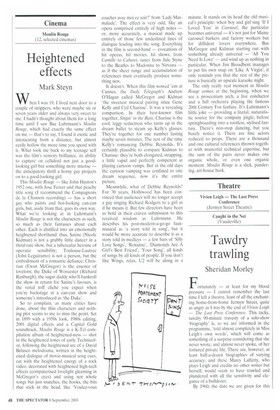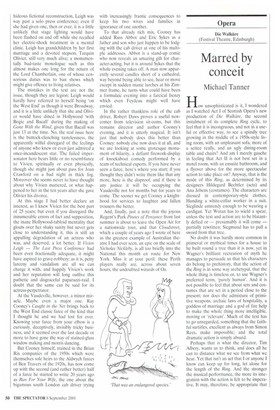Tawdry trawling
Sheridan Morley
Fortunately — at least for my blood pressure — I cannot remember the last time I left a theatre, least of all the enchanting home-from-home Jermyn •Street, quite as angry as I was by the end of Vivien Leigh — The Last Press Conference. This tacky, tawdry 90-minute travesty of a solo-show 'biography' is, so we are informed in the programme, 'told almost completely in Miss Leigh's own words', which will come as something of a surprise considering that she never wrote, and almost never spoke, of her tortured private life. There are, however, at least half-a-dozen biographies of varying accuracy, and these Marcy Lafferty, who plays Leigh and credits no other writer but herself, would seem to have trawled and plundered with all the sensitivity and elegance of a bulldozer.
By 1960, the date we are given for this hideous fictional reconstruction, Leigh was way past a solo press conference; even if she had given one, then or ever, it is a little unlikely that stage lighting would have been flashed on and off while she recalled her electric-shock treatment in a mental clinic. Leigh has grandchildren by her first marriage and a devoted stepson, Tarquin Olivier, still very much alive; a monumentally had-taste monologue such as this almost makes one long for the return of the Lord Chamberlain, one of whose censorious duties was to ban shows which might give offence to living relatives.
The mistakes in the text are not the issue, though they are legion: Leigh would hardly have referred to herself being 'on the West End' as though it were Broadway, and it is a little unlikely that she and Olivier would have dined in Hollywood 'with Bogie and BacaII' during the making of Gone With the Wind, given that Bacall was just 13 at the time. No, the real issue here is the buttock-clenching tastelessness, the apparently wilful disregard of the feelings of anyone who knew or even just admired a once-incandescent star. The failed impersonator here bears little or no resemblance to Vivien, spiritually or even physically, though she might just about pass for Joan Crawford on a bad night in thick fog. Moreover she seems never to have thought about why Vivien mattered, or what happened to her in the ten years after she gave Olivier his divorce.
At this stage I had better declare an interest, as I knew Vivien for the best part of 25 years: but even if you disregard the innumerable errors of fact and supposition, the inane Hollywood-tabloid mentality that gloats over her shaky sanity but never gets close to understanding it, this is still an appalling degradation of an actress who was, and deserved, a lot better. If Vivien Leigh — The Last Press Conference had been even fractionally adequate, it might have aspired to grave-robbery; as it is, petty larceny and vandalism are all we can charge it with, and happily Vivien's work and her reputation will long outlive this pathetic and disgraceful paparazzi-raid. I doubt that the same can be said for its actress-perpetrator.
At the Vaudeville, however, a minor miracle. Maybe even a major one. Ray Cooney's Caught in the Net brings back to the West End classic farce of the kind that I thought he and we had lost for ever. Knowing your farce from your elbow is a curiously, deceptively, invisibly tricky business, and it seemed over the last decade or more to have gone the way of stained-glass window making and morris dancing.
But Cooney himself, trained in the Brian Rix companies of the 1950s which were themselves sole heirs to the Aldwych farces of Ben Travers of the 1920s, has now come up with the second (and rather better) half of a farce he started to write 20 years ago as Run For Your Wife, the one about the bigamous south London cab driver trying with increasingly frantic consequences to keep his two wives and families in ignorance of one another.
To that already rich mix, Cooney has added Russ Abbot and Eric Sykes as a father and son who just happen to be lodging with the cab driver at one of his multiple addresses. Abbot is a stand-up comic who now reveals an amazing gift for character-acting, but it is around Sykes that the whole evening takes off. A man now apparently several candles short of a cathedral, way beyond being able to see, hear or move except in sudden manic lurches at his Zimmer frame, he turns what could have been a formulaic evening into a farcical frenzy which even Feydeau might well have envied.
In the rather thankless role of the cab driver, Robert Daws proves a useful newcomer from television sit-corns, but this remains director and author Cooney's evening, and it is utterly magical. It isn't just that nobody does this better than Cooney: nobody else now does it at all, and we are looking at some grotesque monument of hilarity, a defiant firework-display of knockabout comedy performed by a team of technical experts. If you have never seen a farce, here's where you start; if you thought they didn't write them like that any more, here is the disproof, and if there is any justice it will be occupying the Vaudeville not for months but for years to come. The sooner we get Cooney a knighthood for services to laughter and fallen trousers the better.
And, finally, just a note that the joyous Regent's Park Pirates of Penzance from last summer is about to leave the Open Air for a nationwide tour, and that Cloudstreet, which a couple of years ago I wrote of here as the greatest example of Australian theatre I had ever seen, an epic on the scale of Nicholas Nickleby, is all too briefly into the National this month en route for New York. Miss it at your peril: these Perth players really are, across about seven hours, the undoubted wizards of Oz.



































































 Previous page
Previous page